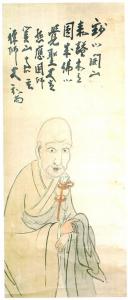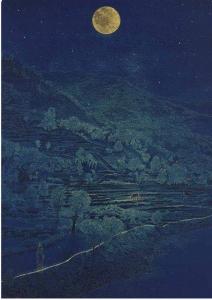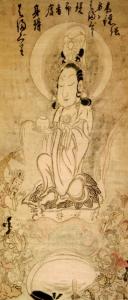
Once in awhile, I hear some trash talk about me and my practice and teaching in both just-sitting and koan introspection Zen. Builds character, you know. But some folks say it just shows a lack of understanding about just-sitting.
Be that as it may be, on the other hand, my first teacher, Katagiri Roshi, once encouraged us to return to what he called “Zen before the Sixth Ancestor,” meaning, before the split between the Sōtō and Rinzai lineages. Another way to put that would be “What is original Zen?”
I took that admonition to heart, travelled around visiting a bunch of teachers, and eventually had the good fortune to work through the Harada-Yasutani reform kōan curriculum, thanks to James Myoun Ford Roshi and company. I’ve also done some studying, and that’s helped a lot, really, to have a sense of our ancestors in context. One thing that I’ve learned is that Katagiri Roshi’s question might have been more about Zen before Dōgen, because it seems that it wasn’t until Japan that Zen got all divided up into very distinct schools (2).
Case in point
In Complete Poison Blossoms from a Thicket of Thorn, #16, Hakuin tells the story of when the last Chinese ancestor in the Cáodòng (Japanese, “Sōtō”) lineage met with the last Chinese ancestor in the Línjì (Japanese, Rinzai) succession. Namely, that would be Rujing and Xutang (3). These two old teachers knew each other, and it appears to me that Rujing was a teacher of Xutang (he was twenty-three years senior), even though the latter probably received dharma transmission when they met.
Xutang would later write a preface to the collected works Rujing’s Japanese student, Dōgen. Not only that, but a student of Dōgen, Tetsu Gikai, may have introduced Nampo Jōmyō to Xutang. Nampo became the first generation in the Rinzai successor in Japan. So they all knew each other. For me, that is just really cool.
Here’s the recorded encounter between Rujing and Xutang:
“When Zen master Xutang met Head Priest Rujing of Ch’ing-tz’u temple, Rujing said, ‘Your parents’ bodies are rotting away in a thicket of razor-sharp thorns. Did you know that?’
‘It is wonderful,” replied Xutang, “but it’s not something to act rashly about.’
Rujing gave Xutang a slap.
Xutang extended his arms, saying, ‘Let’s take it slow and easy.’ (1)
The master [Hakuin] said: The means employed by these two old veterans are exceedingly subtle and mysterious. Scrutinize them carefully and you will find that Rujing’s question is as awesome as the great serpent that devours elephants whole and excretes their dry bones three years later. Xutang’s reply has the vehement purpose of the evil P’o-ching bird, which seeks to devour its mother as soon as it is born.”
Rujing is probably referring to Xutang‘s dharma parents whose truth is buried beneath a thicket of razor-sharp kōan. Click here for a post about Rujing and the mu kōan. In this case, Ju-ching is really laying it down and testing the young teacher, Xutang. Xutang certainly maintains his cool. No stereotypical Rinzai-like shouting or beating even.
This case deserves extended scrutiny to get a sense of the subtle and mysterious. The question for us today is how we get to the rotting bodies or our dharma ancestors so that we might thoroughly digest the truth of Zen before our parents were born. And then give the corpses a decent burial.
(1) The last two lines are included in Waddell’s notes but not cited by Hakuin.
(2) Except for a brief period when Dahui was raising hell in the mid 1100’s with the silent illuminationists but that’s not the theme in this post.
(3) Waddell uses the the old Wades-Giles system for Romanizing the Chinese characters so I go with that here. Pinyin has the names like this: Tiāntóng Rújìng (天童如淨; Japanese: Tendō Nyōjo, 1163–1228) and Xutang Zhiyu 虚堂智愚 (Japanese Kido Chigu, 1185–1269).
Dōshō Port began practicing Zen in 1977 and now co-teaches with his wife, Tetsugan Zummach Sensei, with the Vine of Obstacles: Online Support for Zen Training, an internet-based Zen community. Dōshō received dharma transmission from Dainin Katagiri Rōshi and inka shōmei from James Myōun Ford Rōshi in the Harada-Yasutani lineage. Dōshō’s translation and commentary on The Record of Empty Hall: One Hundred Classic Koans, is now available (Shambhala). He is also the author of Keep Me In Your Heart a While: The Haunting Zen of Dainin Katagiri. Click here to support the teaching practice of Tetsugan Sensei and Dōshō Rōshi.












